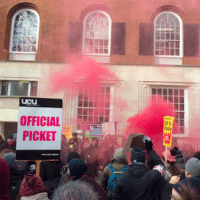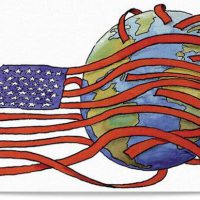-
Technology and capitalism 150 years after Das Kapital
Today, one hundred and fifty years after the publication of the first volume of Capital, Marx remains our contemporary.
-
University strikes: where do we go from here?
On February 22nd the University and College Union (UCU) called for the beginning of a nation wide strike in response to Universities UK’s (UUK) attempt to shift of the Universities Superannuation Scheme from a defined benefit pension to a defined contribution pension.
-
Under the cover of philanthropy: a monopoly machine at work
The long-term costs of allowing a handful of corporations to take over healthcare and agriculture in developing countries, in exchange for vaccinations and hybrid seeds sold at discounted price, will be paid by populations in the Global South once the process of monopolization is complete.
-
The vision of the new society in Marx’s Capital
Marx’s Capital has been heralded for many things, but providing an exhaustive account of a future socialist society isn’t one of them.
-
Working Document 1: In the ruins of the present
Raoul Peck, the Haitian lmmaker, opens his film—Der Junge Karl Marx (2017)—in the forests of Prussia. Peasants gather fallen wood. They look cold and hungry.… Some of the peasants die. Even fallen wood is not allowed to them.
-
Can the Monroe Doctrine triumph in the 21st century?
Although many of us would like to answer this question with a resounding “No!” and insist that our region is well prepared to defend itself against the 1823 pretensions of President James Monroe, with his “America for Americans” -which must be understood as “America for the United States”- it would be a serious mistake to underestimate the risks.
-
Gender and capital 150 years later
We are witnessing an era of conservative backlash on gender rights. Nearly across the board, women make less than men, make up a majority of those in poverty (70% of those in extreme poverty), and face the real prospect of becoming a victim of sexual violence (1-3 internationally).
-
U.S. trade deficits, Trump trade policies, and capitalist globalization
Understandably concerned about the consequences of the large and sustained U.S. trade deficit, many workers have grown tired of waiting for so-called market forces to produce balance. Thus, they cheer Trump administration promises to correct the imbalance through tariffs or reworked trade agreements that will supposedly end unfair foreign trade practices.
-
Today’s capitalism was born in slavery
By 1830, one million Americans, most of them enslaved, grew cotton. Raw cotton was the most important export of the United States, at the center of America’s financial flows and emerging modern business practices, and at the core of its first modern manufacturing industry.
-
Buyback this!
I have been arguing, since 2016, that one of the likely outcomes of the kind of corporate tax cuts Donald Trump and his fellow Republicans have supported—and, as we saw, eventually rammed through—would be an increase in inequality.
-
Imperialist realities vs. the myths of David Harvey
When David Harvey says “the historical draining of wealth from East to West for more than two centuries has largely been reversed over the last thirty years,” his readers will reasonably assume that he refers to a defining feature of imperialism, namely the plunder of living labour and natural wealth in colonies and semi-colonies by rising capitalist powers in Europe and North America. Indeed, he leaves no doubt about this, since he prefaced these words with reference to “the old categories of imperialism.” But here we encounter the first of his many obfuscations.
-
Is another world possible?
On Reality Asserts Itself, Prof. Leo Panitch says it’s a dilemma that the gradualism of European social-democracy and attempts at a more radical transformation have so far both failed; Panitch says a first step towards democratizing the economy is to make finance a public utility – with host Paul Jay
-
Enclosed thinking
In a slave society, one can argue, the interest of the slaves lies in keeping the slave owner happy, for otherwise he is likely to flog and whip them mercilessly which would cause them great agony. Likewise in a caste society, one can argue, the interest of the Dalit lies in being as inconspicuous as possible, in not ‘polluting’ the upper castes through his presence, for otherwise he is likely to be beaten and lynched.
-
Does capitalism depend on credit?
Credit is essential for the continuation of capitalism but also a major source of its instability, writes the Marx Memorial Library.
-
Half a year on from Hurricane Maria, many Puerto Ricans lack running water and electricity
PUERTO RICANS marked six months today since the formation of Hurricane Maria, which devastated the island, causing about $100 billion (£72bn) in damage.
-
Utopia and healthcare (part 2)
The dystopia of the American healthcare system certainly invites a utopian response—a ruthless criticism as well as a vision of an alternative.
-
Imperialism today: a critical assessment of Latin American dependency theory
The main theorist of dependency anticipated trends of neoliberal globalization. He analyzed productive globalization, the centrality of exploitation and the relative weight of surplus value transfers. But the employment crisis exceeds what was envisaged by Marini, in a scenario disrupted by the mutation of the United States, the collapse of the USSR and the rise of China.
-
Dossier 1: Crisis in the Korean Peninsula
The crisis is not merely geopolitical. It is human. 75 million people live in the peninsula. This is about their lives and futures.
-
Biofinance
Capitalism has been the subject of too many conflicting definitions for any of the claims that follow to have any purchase on truth — understood as an adequation to the real. Beneath the numerous disagreements, however, a common substratum can be gleaned between the liberal Smithian, and the classical Marxist and Weberian positions: capitalism is a system geared at fostering accumulation for its own sake.
-
Willetts the conqueror (part 3): human capital
The following post is the third instalment of the multi-part review of David Willetts’ ‘A University Life’, you can find here the Introduction; Part 1 and Part 2. Parts 3 and 4 take a slightly different approach, diving deeper into the fundamental principles of marketisation, which centre on the conversion of qualitative experience and practice into quantitatively measurable outcomes, which can in turn become proxies for higher education’s exchange value.




















